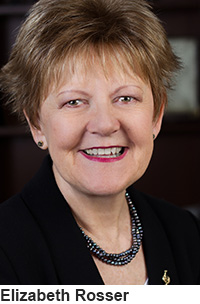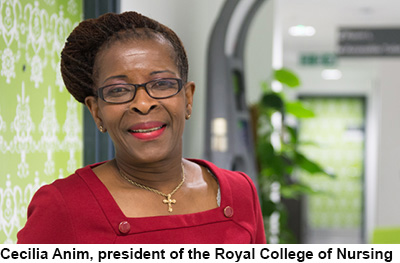STTI board member represents honor society at RCN centennial celebration.
 In 1916, six years after the passing of Florence Nightingale and six years before the founding of the Honor Society of Nursing, Sigma Theta Tau International (STTI), the organization that would later become known as the Royal College of Nursing (RCN) was born. The first organization to secure professional status for nurses, RCN today has 432,000 members, comprising registered nurses, student nurses, and healthcare assistants. In November, the RCN convened a two-day International Centenary Conference at the Queen Elizabeth II (QEII) Centre in London to celebrate and reflect on its first 100 years while looking ahead to the next hundred. Elizabeth Rosser, a member of the STTI board of directors, was there and filed this report for the board and for Reflections on Nursing Leadership (RNL).
In 1916, six years after the passing of Florence Nightingale and six years before the founding of the Honor Society of Nursing, Sigma Theta Tau International (STTI), the organization that would later become known as the Royal College of Nursing (RCN) was born. The first organization to secure professional status for nurses, RCN today has 432,000 members, comprising registered nurses, student nurses, and healthcare assistants. In November, the RCN convened a two-day International Centenary Conference at the Queen Elizabeth II (QEII) Centre in London to celebrate and reflect on its first 100 years while looking ahead to the next hundred. Elizabeth Rosser, a member of the STTI board of directors, was there and filed this report for the board and for Reflections on Nursing Leadership (RNL).
—James E. Mattson, editor, RNL
 Delegates from around the globe attended an excellent celebration at RCN’s International Centenary Conference. Of those who came from outside the United Kingdom, representatives of Commonwealth countries were most prevalent, but the United States was also well-represented. Because of commitments to the institution I serve, I was able to attend only the first day of the conference—22 November—but what I observed was memorable.
Delegates from around the globe attended an excellent celebration at RCN’s International Centenary Conference. Of those who came from outside the United Kingdom, representatives of Commonwealth countries were most prevalent, but the United States was also well-represented. Because of commitments to the institution I serve, I was able to attend only the first day of the conference—22 November—but what I observed was memorable.
The day opened with a welcome from Cecilia Anim, president of the Royal College of Nursing
and chair of the conference, followed by a welcome from Jane Cummings, chief nursing officer, Nursing Directorate, NHS England. Together, they set the scene for the next two days. James Campbell, director of Health Workforce for the World Health Organization, then delivered the keynote, an extremely worthwhile address that identified challenges facing nursing and midwifery workforces—now and in the future. Not the least of these challenges is the global shortage of nurses and the need to make our voices heard in today’s climate.
After a break for refreshment as well as exhibit and poster viewing, Maureen Bisognano, president emerita and senior fellow of the Institute for Healthcare Improvement, USA, engaged listeners with a presentation titled “An exciting future for nurses and nursing,” in which she identified key roles for nursing that have recently sprung up in Europe and are making a significant impact on the way professional nurses work. She also demonstrated “smarter” ways of working that are really making a difference in people’s lives.
The morning wrapped up with a presentation by Phumzile Mlambo-Ngcuka, undersecretary-general and executive director of UN Women. In an address titled “Education and eliminating violence against women,” she emphasized education as key to reducing this violence. Click here to access the full programme and to learn more about these and other speakers.
 I used the morning and lunch breaks to meet some fascinating delegates and to spread the word about STTI—what it stands for and what our chapter in England is doing. [The author is president of the all-England Phi Mu Chapter.] In addition to handing out brochures about the honor society and providing my business card to enable follow-up, I took the opportunity to thank President Anim for inviting a delegation from STTI and to follow up on a previous offer at RCN Congress, held earlier in 2016, to work together synergistically on behalf of nurses and nursing in the United Kingdom.
I used the morning and lunch breaks to meet some fascinating delegates and to spread the word about STTI—what it stands for and what our chapter in England is doing. [The author is president of the all-England Phi Mu Chapter.] In addition to handing out brochures about the honor society and providing my business card to enable follow-up, I took the opportunity to thank President Anim for inviting a delegation from STTI and to follow up on a previous offer at RCN Congress, held earlier in 2016, to work together synergistically on behalf of nurses and nursing in the United Kingdom.
Highlighting one such contact, I met an eminent professor at lunch who had just arrived at the conference after making a presentation at Parliament’s House of Lords earlier that morning. Clearly, the RCN is working continuously for nurses and nursing, and promoting alliances would be good. In the course of the morning, I also met an STTI member from Peru, South America, who represents the Latin American Region.
Concurrent sessions are just that—concurrent—which means you can’t attend them all, but the ones I attended were fascinating. I learned about advances in dementia care being made by Admiral Nurses, who are funded by the government to help dementia sufferers and their families remain at home in the community. I was amazed at the progress they are making.
I sat in on a session that addressed development of advanced practice nurses in the U.K., particularly in intensive care units, and learned how their development and advancement are helping to plug a gap in the workforce caused by insufficient numbers of medical staff. While listening to a presentation on “Taking control of data; how nurses can use it to influence better care,” I was very surprised at how regular and systematic collection of data has begun to make a difference in controlling infection and alleviating pressure ulcers. Fascinating!
Following the afternoon break, I attended three more sessions: “Nursing in a digital age,” by Gerry Bolger; a session highlighting leadership development work by RCN on behalf of nurses and midwives; and a discussion session presented by the National Institute for Health Research (NIHR) about the Clinical Research Network and the range of research opportunities available to nurses.
It’s a two-hour journey from my home near the south coast of England to the QEII Centre in London, and I had left home at 5 a.m. By the time I finished attending my last session at 6 p.m., it had already been a full day, but I was ready for the walk to the Royal College of Nursing for the evening’s social event—meeting with delegates at RCN headquarters in Cavendish Square—before catching the 8:30 p.m. train back to Bournemouth.
The walk from the QEII Centre to RCN headquarters is spectacular. It takes you past both houses of Parliament and Big Ben, along Whitehall and past large government buildings, Horse Guards Parade, and No. 10 Downing Street, home of the United Kingdom’s prime minister. We also walked across Trafalgar Square and Piccadilly and up beautifully lit Regents Street, which were all clothed in Christmas decorations. Quite a sight to behold! We returned to RCN headquarters via Oxford Street.
I was sorry I couldn’t stay for the second day of plenary and concurrent sessions the programme offered. Keynote speakers for that day included Christine Hancock, director, C3 Collaborating for Health; Matt King, OBE, patient advocate; Susan Hamer, director of nursing, learning, and organizational development for the NIHR Clinical Research Network; and Frances Hughes, chief executive officer, International Council of Nurses, Geneva. Later reports from those who did attend confirmed that they were well worth listening to.
In addition to keynotes and concurrent sessions, nearly 70 poster presentations were available for viewing both days. The authors had obviously gone to considerable effort to make their posters eye-catching and informative.
Even though I attended just one day of the International Centenary Conference, I felt I had made the most of it. I made sure that the Honor Society of Nursing, Sigma Theta Tau International was visibly represented and that key organizers, eminent attendees, and delegates knew of STTI, its work, and its board of directors.
I met with Rod Thompson, RCN vice president, and delegates from the southern tip of England and Wales who had experienced tortuous journeys the previous day with torrential rains affecting both rail and road transport. I also conversed with colleagues from across England as well as Malta, learning more about the good work nurses are doing and challenges they are facing.
My thanks to the board of directors of the Honor Society of Nursing, Sigma Theta Tau International for asking me to represent STTI on the centennial of the founding of the Royal College of Nursing. It was an honor!
Elizabeth Rosser, DPhil, RN, MN, Dip N Ed, Dip RM, RNT, PFHEA, is professor of nursing and deputy dean, education and professional practice at Bournemouth University in Bournemouth, Dorset, United Kingdom. Elected in 2015 to the board of directors of the Honor Society of Nursing, Sigma Theta Tau International, Rosser is a key member of the European Regional Committee and chairs STTI’s European Region Communications Committee. She also serves as president of the all-England Phi Mu Chapter. As chapter president, Rosser has initiated a biennial conference and holds scholarly events across the country to introduce students and nurse leaders to the work of the honor society. Rosser, who has a keen interest in transcultural care, worked for six years as a nurse/midwife in Colombia, South America.